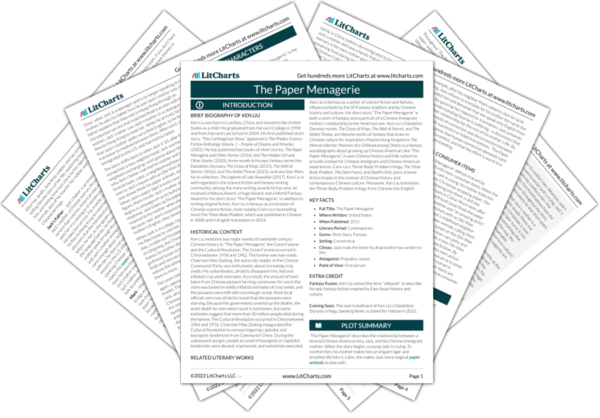In “The Paper Menagerie,” familial love is always vulnerable to estrangement or destruction, whether by large historical forces or by more personal failings. Thus, the story suggests that such love is inherently fragile. In a letter to her Chinese American son Jack, Jack’s mother explains how larger forces destroyed her own family in China, before she immigrated to the U.S. Clearly, Jack’s mother did have a family that loved her: her earliest memory is her own mother giving her the family’s only remaining food during the Great Famine in China. Yet during the Chinese Cultural Revolution, which pitted “brother against brother,” both her parents died, and she was left an orphan. Jack’s mother eventually fled orphanhood and exploitation through an introduction service, but Jack’s comments on his father “buying” his mother from a catalogue suggests that whatever his mother found in the U.S., it wasn’t genuine family. Furthermore, American racism tears apart Jack’s own family: after overhearing his neighbors’ racist gossip and suffering racist bullying at the hands of his classmates, Jack turns on his mother. Because he refuses to listen to her when she speaks Chinese and criticizes her English, they stop speaking to each other, becoming estranged until her death. Jack’s father sides with him, reinforcing the idea that his parents’ marriage wasn’t founded on genuine love to begin with.
“The Paper Menagerie” also suggests that although families can’t always be successfully rebuilt, remembrance can help heal estrangement. Though orphaned at the age of 10, Jack’s mother continues to write letters to her dead parents, fold the letters into magical paper cranes, and send the cranes flying toward China. When Jack is a child, she includes him in this ritual. Similarly, after his mother’s death, Jack partially reconciles with her by reading a letter she has left for him within a paper tiger and remembering her. In “The Paper Menagerie,” then, elusive familial love often survives most strongly through remembrance of what’s been lost.
Familial Love and Estrangement ThemeTracker

Familial Love and Estrangement Quotes in The Paper Menagerie
A little paper tiger stood on the table, the size of two fists placed together. The skin of the tiger was the pattern on the wrapping paper, white background with red candy canes and green Christmas trees.
[…]
“Zhe jiao zhezhi,” Mom said. This is called origami.

Unlock explanations and citation info for this and every other The Paper Menagerie quote.
Plus so much more...
Get LitCharts A+“English,” I said. “Speak English.”
She tried. “What happen?”
I pushed the chopsticks and the bowl before me away: stir-fried green peppers with five-spice beef. “We should eat American food.”
Dad tried to reason. “A lot of families cook Chinese sometimes.”
“We are not other families.” I looked at him. Other families don’t have moms who don’t belong.
He looked away. And then he put a hand on Mom’s shoulder. “I’ll get you a cookbook.”
Dad bought me a full set of Star Wars action figures. I gave the Obi-Wan Kenobi to Mark.
I packed the paper menagerie in a large shoe box and put it under the bed.
“If I don’t make it, don’t be too sad and hurt your health. Focus on your life. Just keep that box you have in the attic with you, and every year, at Qingming, just take it out and think about me. I’ll be with you always.”
Qingming was the Chinese Festival for the Dead. When I was very young, Mom used to write a letter on Qingming to her dead parents back in China, telling them the good news about the past year of her life in America. She would read the letter out loud to me, and if I made a comment about something, she would write it down in the letter too. Then she would fold the letter into a paper crane and release it, facing west. We would then watch as the crane flapped its crisp wings on its long journal west, toward the Pacific, toward China, toward the graves of Mom’s family.
Susan found the shoe box in the attic. The paper menagerie, hidden in the uninsulated darkness of the attic for so long, had become brittle, and the bright wrapping paper patterns had faded.
“I’ve never seen origami like this,” Susan said. “Your mom was an amazing artist.”
The paper animals did not move. Perhaps whatever magic had animated them stopped when Mom died. Or perhaps I had only imagined that these paper constructions were once alive. The memory of children could not be trusted.
I took the letter with me downtown, where I knew the Chinese tour buses stopped. I stopped every tourist, asking, “Nin hui du zhongwen ma?” Can you read Chinese? I hadn’t spoken Chinese in so long that I wasn’t sure if they understood.
You know what the Chinese think is the saddest feeling in the world? It’s for a child to finally grow the desire to take care of his parents, only to realize that they were long gone.
The young woman handed the paper back to me. I could not bear to look into her face.
Without looking up, I asked for her help in tracing out the character for ai on the paper below Mom’s letter. I wrote the character again and again on the paper, intertwining my pen strokes with her words.
The young woman reached out and put a hand on my shoulder. Then she got up and left, leaving me alone with my mother.
Following the creases, I refolded the paper back into Laohu. I cradled him in the crook of my arm, and as he purred, we began the walk home.











